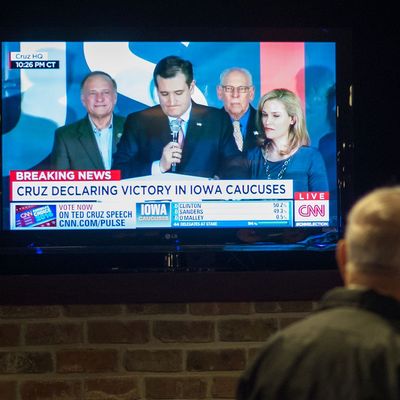
One of the great quadrennial rituals of our presidential-nominating system is the descent of candidates on Iowa (e.g., the 19 who appeared in Cedar Rapids at this year’s Iowa Democratic Hall of Fame Dinner) at about this point in the cycle. Close behind it in predictability is the rise of complaints about Iowa’s First-in-the-Nation caucuses and their privileged status. This year it’s Michelle Cottle who has offered an exceptionally high-profile objection to the whole thing. Here’s a sample, though if you’ve read this sort of argument before, you can practically recite it without a script:
Demographically speaking, the Iowa electorate looks about as much like the face of America as does the Senate Republican conference. Which says a lot.
Iowa’s caucuses are mind-numbingly convoluted and anti-democratic, favoring the most motivated, well-organized few over the less-obsessive majority of Iowans. More fundamentally, granting one state — any state — a perennial lock on the pole position of presidential voting fosters a sense of entitlement resulting in a quadrennial parade of pandering that borders on the absurd. Ethanol subsidies? Seriously?
To her credit, Cottle understands that we’ve been hearing such complaints for eons, saying: “Hating on the Iowa caucuses has become a cliché.” Some of the particulars of her indictment are a bit off, though. Yes, caucuses don’t enlist as much participation as government-sponsored primaries, but party-sponsored primaries don’t do much better. Who’s going to force the taxpayers of Iowa to pay for official presidential-nominating contests? Since Iowans are by and large very happy with the status quo, that ain’t happening.
Her dismissal of Iowa Democratic Party efforts (via a “virtual caucus”) to comply with new rules allowing for participation in the caucuses without physically attending them seems a bit churlish as well: It’s an entirely new and untested system, so it might be wise to let it operate at least once before denouncing it as a sham.
The idea that Iowa (alongside New Hampshire, site of the first primary) maintains a death grip on the nominating process by unrepresentative, too-white electorates is a bit outdated as well. Between the 2004 and 2008 cycles, both national parties agreed to move two other states, Nevada (holding caucuses) and South Carolina (with a primary) into the charmed circle of contests sanctioned to kick off the nominating process to provide geographic and racial-ethnic balance (Nevada has a sizable Latino population; South Carolina an even more sizable African-American population). This reform was also a good example of how Iowa has adapted to all the criticism over its preeminence by giving up a bit of power in order to create allies willing to help it defend the power it retains. If they had to, I have no doubt Iowa Republicans and Democrats would support allowing other states to go “early” — though not first — in order to hang onto that First-in-the-Nation designation.
Ultimately, though, Iowa’s primacy depends on the perpetual willingness of presidential candidates to reinforce it. Since the caucuses became major events in 1976, only one successful presidential nominee — Bill Clinton in 1992 — has skipped Iowa, and that was a unique case because Iowa’s own Tom Harkin was running, making the caucuses irrelevant that year. But just participating in the caucuses isn’t enough: Iowans expect prospective candidates to come early and often, and if possible, to spend money and time promoting their own local candidates and their own party infrastructure. And naturally, once candidates have invested in Iowa, they have every interest in recouping that investment instead of supporting some effort to remove the caucuses from their traditional role.
And so the current system, with occasional tweaks and even reforms, lurches along. Those like Cottle who crave a more rational system sometimes fail to comprehend that the nominating process requires action not just by the national party but by state parties and bipartisan state legislatures. She personally favors the idea of rotating regional primaries, an idea that’s been kicking around forever. Actually making that happen across state and party lines would be a gargantuan undertaking. At a minimum, it would require a big push from a powerful figure like, say, a very popular incumbent president with no fear of alienating people in the early states.
There are already gradual developments underway that further erode the old Iowa–New Hampshire duopoly, most notably early voting: On the very same day of the Iowa caucuses next year, by-mail voting for the immense California presidential primary will begin. In the end, though, somebody has to have the first official nominating-contest results, with whatever consequences that might have for winners and losers. Iowans figure it might as well be themselves going first. They have the experience. This cycle will go on as in the past, and for the foreseeable future, the rest of us should just get used to it.






























